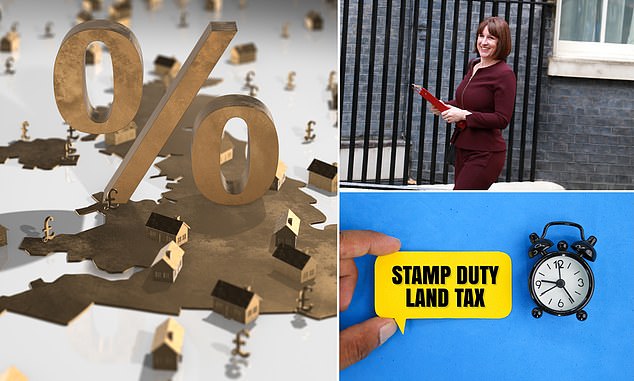Table of Contents
The Government has targeted landlords and second homeowners in today’s budget, implementing an unexpected increase in the stamp duty they pay when purchasing a property.
These buyers already face a 3 per cent surcharge on top of what those who buy a property to live in pay.
However, starting tomorrow that figure will rise to 5 per cent, in a move that could lead to fewer homeowners purchasing new investments.
Buy-to-let attack: From tomorrow, stamp duty on an additional property will rise from 3 to 5 per cent
How much stamp duty will homeowners now pay?
Under current rules, a £300,000 property with the surcharge included would cost £11,500 in tax.
It will now rise to £17,500 and the surcharge will increase by 5 per cent.
On the same property, a person buying the house to live in would pay just £2,500, and if they were a first-time buyer, nothing at all.
Buying a second home that cost £500,000 previously cost £27,500. From tomorrow it will cost someone £37,500.
How have real estate investors responded?
Richard Donnell, head of research and insight at property website Zoopla, said a higher proportion of second home owners were already looking to sell properties, before this additional surcharge was announced.
He added that now this figure will increase even more.
‘Second home buyers are already responding to last year’s budget, which allowed councils to charge double council tax on second homes. “This translates into a higher level of sales by second home owners,” Donnell said.
“In areas with above-average second homes we have seen four times as many homes come to market.”
Mortgage broker Chris Sykes, of Private Finance, said he already has clients on the phone, panicking about changes to sales already in process.
This includes some who are not homeowners but simply have a short period between purchasing their new home and selling their old one.
“We’ve had customers already call to see if their transactions are still working,” Sykes said.
‘For example, a situation where a client buys a new home before selling their old one and may lack cash flow now after the stamp duty change.
‘This is a bold decision by the Government. It presents some potential problems. For example, anyone who sells to an investor can watch their business fall apart.’
What did the owners expect?
Homeowners and second homeowners were hoping for an increase in capital gains tax in the Budget, which is charged on the profits they make when they sell a home that has increased in value.
An increase in stamp duty could be considered more severe as it is charged when purchasing a property and before any return on your investment has been made.
Peter Stimson, head of product at MPowered Mortgages, added: ‘Rental and second home owners were hoping for another tax cut from the Chancellor, but what they got was a blow with a hammer.
“It is not an increase in general tax or capital gains tax they pay when selling a rental property, but a huge 2 per cent increase in stamp duty payable when buying a rental home.”
Will this lead to higher rents for tenants?
The concern among some property experts is that the increase in stamp duty could mean fewer homes are available to rent in the future.
An imbalance between supply and demand in the rental market has caused rents to increase in recent years, up 40 percent since June 2020, according to HomeLet.
Last month, Rightmove reported that the proportion of former rental properties coming up for sale is the highest on record.

MPowered Mortgages’ Peter Stimson said rents could now rise even further
It said 18 percent of homes now for sale were previously available for rent, compared to 8 percent in 2010.
Meanwhile, in the first half of this year, the proportion of homes bought by homeowners fell to its lowest level in 14 years, according to new data, and mortgages granted to them have more than halved.
According to real estate agency Hamptons, only one in ten homes sold during the first half of this year was to a buy-to-let investor. This was the lowest proportion since records began in 2010.
MPowered Mortgages’ Stimson said: “The changes come into effect from tomorrow, so there is now a real danger of thousands of purchases already in the pipeline being abandoned.”
Stimson said that while landlords may be discouraged from buying, renters may be the most affected by these changes and rents will potentially now rise higher and faster.
This is because if there are fewer homes available to rent, there could be more competition between tenants and landlords could charge more.
‘The irony is that it won’t just be the owners who will feel the pain. “A third of Britons do not own their own home and, for many of them, renting privately is the only option,” he adds.
“With rents already rising and the supply of rental properties set to be further disrupted, rents could now rise even further.”
Some links in this article may be affiliate links. If you click on them, we may earn a small commission. That helps us fund This Is Money and keep it free to use. We do not write articles to promote products. We do not allow any commercial relationship to affect our editorial independence.

